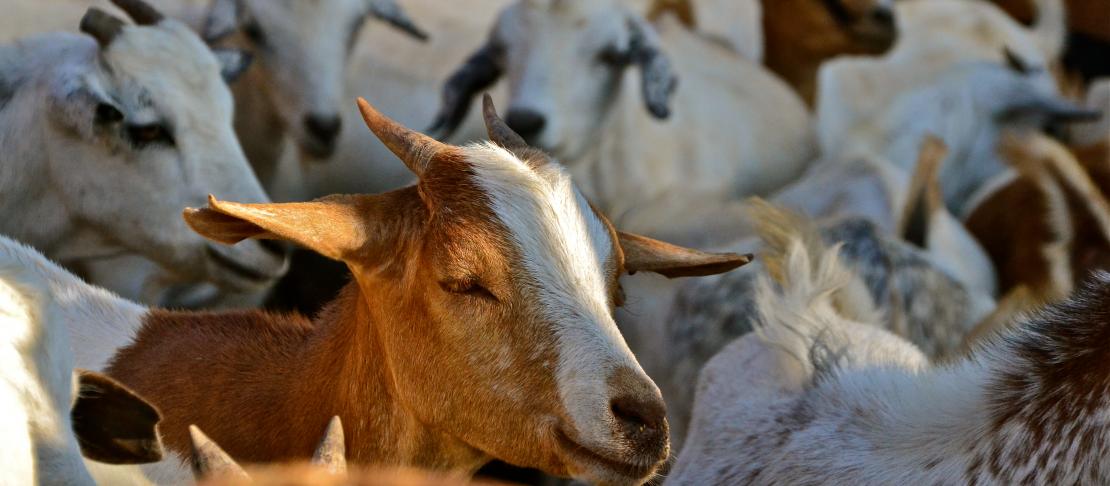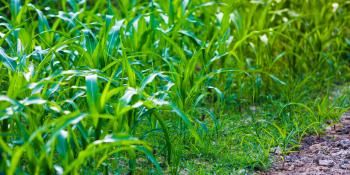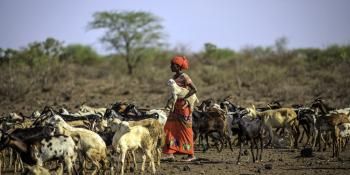Nyando white goats: climate-resilient and a real-time fortune

Hardy Gala goats give Nyando farmers quick, better returns enabling them to fight climate change.
Gala goats are changing lives of farmers in Nyando, western Kenya. Introduced by World Neigbours, the International Livestock Research Institute (ILRI) through support by the CGIAR Research Program on Climate Change Agriculture and Food Security (CCAFS), due to a demand from farmers for more resilient and improved goat breeds, they are proving to be a promising climate-smart livestock and a fortune maker to livestock farmers in Nyando.
The initial batch of about 60 gala bucks was introduced in Nyando Climate-Smart Villages (CSVs) in late 2011, for upgrading the local small East African goats. The Gala goat is known for its resilience to drought, resistance to internal parasites, heat stress and diseases. Their feed intake is less, with higher growth rates (two-three times in weight), maturing twice faster than the local goats, thus attracting higher market demand and offering quick and more returns to farmers. They are also known for their twinning characteristics. However, twinning characteristics are also common in local goats that have been served by Gala bucks, observes Reuben Sigei, a goat farmer in Nyando.
The Gala goats are part of a portfolio of climate-smart agriculture interventions farmers are testing in Nyando through a partnership involving CCAFS, ILRI, World Neighbours, Vi Agroforestry, Kisumu and Kericho County Departments of Agriculture, Livestock and Fisheries, and farmers through Community-Based Organisations (CBOs). The initiative seeks to enhance the capacity of local farmers to adapt to climate change and manage climate-related risks by improving their knowledge, promoting local innovations and technology transfer.
About 65 percent of farmers in Nyando keep goats, as a source of income for meeting various household needs. Gala goats are widely accepted; every goat farmer in Nyando now has Gala crossbreeds. Farmers who were not keeping goats before are rapidly embracing goat keeping. Through CBOs, other farmers from surrounding villages are learning about the benefits of crossbreeding and are purchasing Gala crossbreeds resulting in widespread adoption beyond the target communities. ILRI scientists provide technical support to the CBOs by training community volunteers - paravets - to support farmers in livestock record keeping, pest and disease control and also checks on inbreeding.
Currently, the Gala crossbreeds in Nyando are estimated to be more than 15,000 goats. About 12,000 of these have been sold by farmers in the local and neighboring markets, earning income for school fees, purchase of farm inputs (seeds and fertilizer), improving shelter, other household consumption and utilities, and meeting social needs. The average price of a mature Gala goat crossbreeds ranges from Kenya shillings 8,000 to 12,000 (USD 80 to 120) which is 2-3 times higher than the price of the local small East African goat.
Emerging annual goat auction
As the uptake of the gala crossbreeds increase, farmers are coming up with innovative ways of marketing their livestock. In the upper parts of Nyando among the Kalenjin community, an annual goat auction is emerging. The first of this kind of goat auction was held in 2014, organized by the Kalenjin community, as the area has relatively high population of goats. About 1,500 goats were auctioned at Barng’oror village. The second annual goat auction was held in December 2015 at the same venue, with the Kenyan Deputy President (DP), His Excellency William Samoei Ruto as chief guest. The DP was very impressed about the CSVs, in particular promotion of livestock as a way of addressing climate change, food insecurity and improving incomes. He urged the champion farmers to continuously share knowledge with their neighbours for learning and wider adoption of new technologies. About 4000 goats were sold, a single gala goat fetching between Kenya shillings 13,000 to 16,000 (USD 130 - 160).
Sharing of emerging lessons continues in the villages through various innovative avenues. In July 2016, two Nyando CBOs, namely Friends of Katuk Odeyo (FOKO) and Kapsokale, organized farmer learning events. Hundreds of farmers learnt about innovative farming technologies and practices viable to them, given the increasingly unpredictable weather. This included resilient goat and sheep breeds kept by various farmers. CCAFS will continue partnering with like-minded organizations to avail and promote evidence-based solutions for climate change adaptation and mitigation.
Read more
Wilson Nindo and Caroline Kibii are Field Technicians at Vi Agroforestry.



